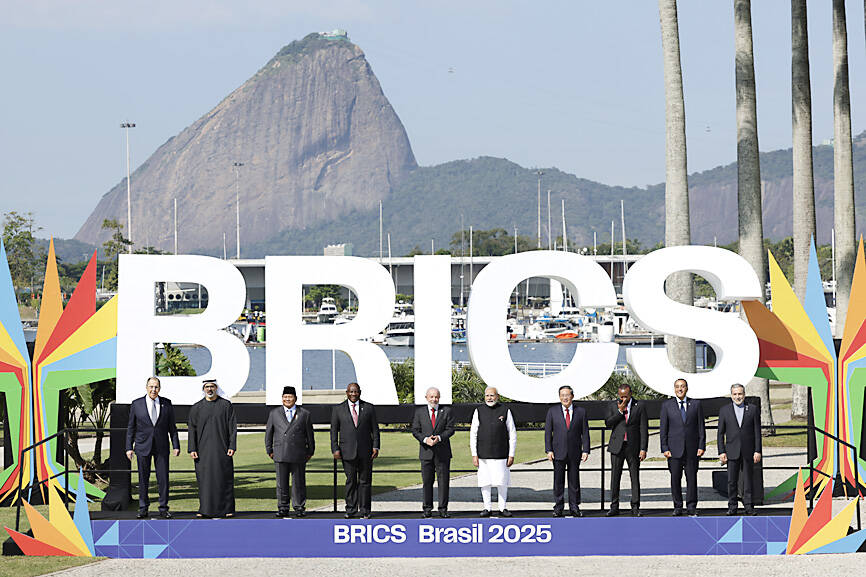BRICS leaders at a summit on Sunday offered symbolic backing to fellow member Iran, condemning a series of military strikes on nuclear and other targets carried out by Israel and the US.
Conceived two decades ago as a forum for fast-growing economies, the BRICS have come to be seen as a Chinese-driven counterbalance to US and western European power, but as the group has expanded to include Iran, Saudi Arabia and others, it has struggled to reach meaningful consensus on issues from the Gaza war to challenging US global dominance.
BRICS nations, for example, collectively called for a peaceful two-state solution to the Israel-Palestinian conflict — despite Tehran’s long-standing position that Israel should be destroyed.

Photo: EPA
An Iranian diplomatic source said that his government’s “reservations” had been conveyed to the Brazilian hosts. Still, Iran — a BRICS member since 2023 — stopped short of rejecting the statement outright.
The bloc also called for an “immediate” ceasefire and the “full withdrawal of Israeli forces” from the Gaza Strip, where Israel has been at war with Palestinian militant group Hamas for 21 months.
Hamas’ armed wing welcomed the BRICS’ position, calling on them to “exert pressure” on Israel to “lift the criminal siege imposed on two and a quarter million people.”
In perhaps a further sign of the diplomatic sensitivities, Saudi Arabia’s foreign minister skipped Sunday’s discussions entirely, a Brazilian government source said.
Saudi Arabia is among the world’s leading beneficiaries of high-tech US military exports and is a long-standing US partner.
The political punch of this year’s summit has been depleted by the absence of Chinese President Xi Jinping (習近平), who skipped the meeting for the first time in his 12 years as president.
The Chinese leader is not the only notable absentee. Russian President Vladimir Putin, charged with war crimes in Ukraine, also opted to stay away, participating via videoconference.
He told counterparts that BRICS had become a key player in global governance.
The summit also called for regulation governing artificial intelligence and said the technology could not be the preserve of only rich nations.
The artificial intelligence sector is dominated by US tech giants.

WAITING GAME: The US has so far only offered a ‘best rate tariff,’ which officials assume is about 15 percent, the same as Japan, a person familiar with the matter said Taiwan and the US have completed “technical consultations” regarding tariffs and a finalized rate is expected to be released soon, Executive Yuan spokeswoman Michelle Lee (李慧芝) told a news conference yesterday, as a 90-day pause on US President Donald Trump’s “reciprocal” tariffs is set to expire today. The two countries have reached a “certain degree of consensus” on issues such as tariffs, nontariff trade barriers, trade facilitation, supply chain resilience and economic security, Lee said. They also discussed opportunities for cooperation, investment and procurement, she said. A joint statement is still being negotiated and would be released once the US government has made

NEW GEAR: On top of the new Tien Kung IV air defense missiles, the military is expected to place orders for a new combat vehicle next year for delivery in 2028 Mass production of Tien Kung IV (Sky Bow IV) missiles is expected to start next year, with plans to order 122 pods, the Ministry of National Defense’s (MND) latest list of regulated military material showed. The document said that the armed forces would obtain 46 pods of the air defense missiles next year and 76 pods the year after that. The Tien Kung IV is designed to intercept cruise missiles and ballistic missiles to an altitude of 70km, compared with the 60km maximum altitude achieved by the Missile Segment Enhancement variant of PAC-3 systems. A defense source said yesterday that the number of

‘CRUDE’: The potential countermeasure is in response to South Africa renaming Taiwan’s representative offices and the insistence that it move out of Pretoria Taiwan is considering banning exports of semiconductors to South Africa after the latter unilaterally downgraded and changed the names of Taiwan’s two representative offices, the Ministry of Foreign Affairs (MOFA) said yesterday. On Monday last week, the South African Department of International Relations and Cooperation unilaterally released a statement saying that, as of April 1, the Taipei Liaison Offices in Pretoria and Cape Town had been renamed the “Taipei Commercial Office in Johannesburg” and the “Taipei Commercial Office in Cape Town.” Citing UN General Assembly Resolution 2758, it said that South Africa “recognizes the People’s Republic of China (PRC) as the sole

Taiwanese exports to the US are to be subject to a 20 percent tariff starting on Thursday next week, according to an executive order signed by US President Donald Trump yesterday. The 20 percent levy was the same as the tariffs imposed on Vietnam, Sri Lanka and Bangladesh by Trump. It was higher than the tariffs imposed on Japan, South Korea and the EU (15 percent), as well as those on the Philippines (19 percent). A Taiwan official with knowledge of the matter said it is a "phased" tariff rate, and negotiations would continue. "Once negotiations conclude, Taiwan will obtain a better